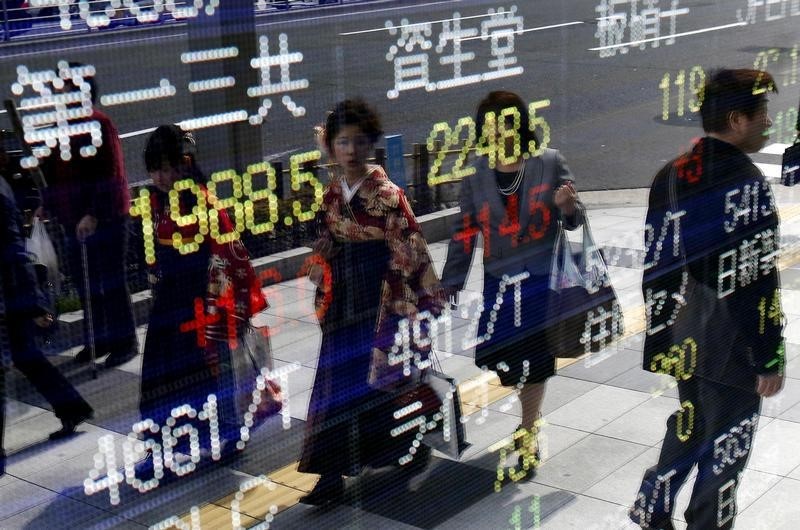This post was originally published on this site

Investing.com – Asia Pacific stocks were up on Friday morning, while U.S. equity futures wavered. However, investors continue to calculate the economic and monetary-policy impact of Thursday’s Russian invasion of Ukraine and the Western sanctions on Russia that followed.
Japan’s Nikkei 225 climbed 1.56% by 9:08 PM ET (2:08 AM GMT). Data released earlier in the day showed that the Tokyo core consumer price index (CPI) grew 0.5% year-on-year in February 2022. The Tokyo CPI grew 1% year-on-year, while the CPI Tokyo Ex Food and Energy index grew 0.2% month-on-month.
South Korea’s KOSPI rose 1.04% and in Australia, the ASX 200 was up 0.38%.
Hong Kong’s Hang Seng Index was up 0.35%.
China’s Shanghai Composite rose 1.28% and the Shenzhen Component rose 1.18%.
U.S. shares fell after Thursday’s volatile session that saw the S&P 500 gain 1.5% and the Nasdaq 100 briefly fall into a bear market before climbing 3.4%. U.S. Treasuries were mixed, with the benchmark 10-year yield moving upward. In Asia Pacific, bonds in Australia and New Zealand fell.
U.S. President Joe Biden swiftly slapped stiffer penalties on Russia after the latter’s forces moved towards the Ukrainian capital city of Kyiv. The measures include sanctions against five major Russian banks to block their access to foreign currency.
With Russia and Ukraine both major grain exporters, investors are weighing the potential impact of the invasion. These include possible inflation and the impact of Western sanctions. With almost $200 billion in stock-market value, and roughly a third of the sovereign debt’s value wiped out in Russia, the Central Bank of the Russian Federation (Bank of Russia) took emergency action.
Biden’s announcement leaves markets “looking at some additional sanctions being added but certainly not as bad as it possibly could have been,” State Street Corp (NYSE:STT). macro strategist Emily Weis told Bloomberg. That contributed to the Wall Street “risk rally,” she added.
Meanwhile, the U.S. Federal Reserve is likely to hike interest rates in March 2022 despite the uncertain situation in Ukraine. Cleveland Fed President Loretta Mester said that “barring an unexpected turn in the economy, I believe it will be appropriate to move the funds rate up in March and follow with further increases in the coming months.”
Although expectations of central bank interest rate hikes have slightly decreased, the Fed is widely expected to implement around six hikes. Across the Atlantic, the European Central Bank said the repercussions of the Russian invasion of Ukraine could delay, but not stop, asset tapering in 2022.
“How is the Fed going to react to this geopolitical risk?” Optimal Capital Advisors director of strategy Frances Stacy told Bloomberg. “That’s where we’re seeing spikes, where we start to try and reprice speculation around that.”
U.S. data, including durable goods, the PCE price index (PCE deflator), and the University of Michigan consumer sentiment, is due later in the day.


